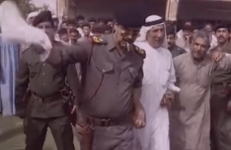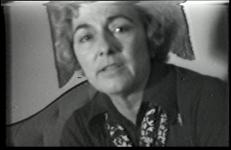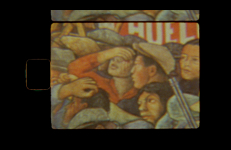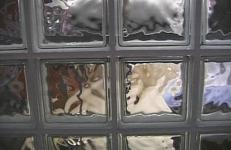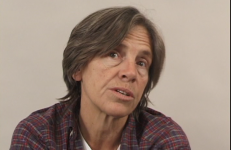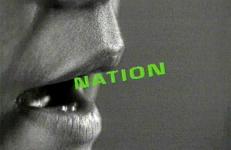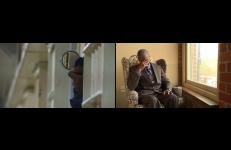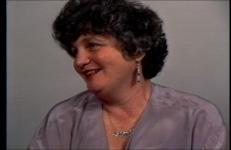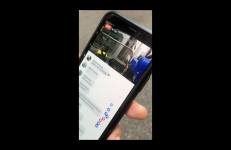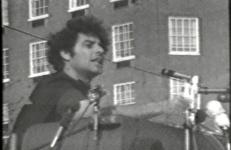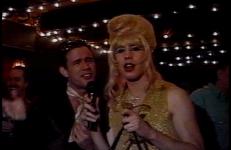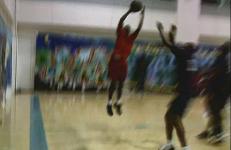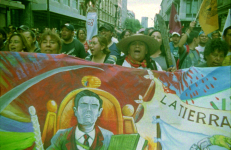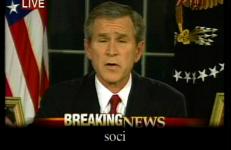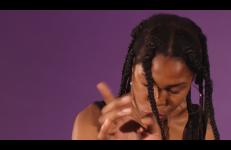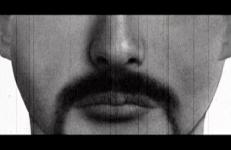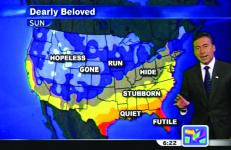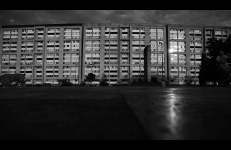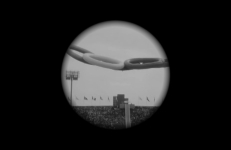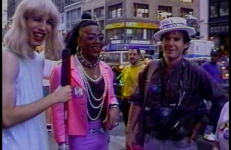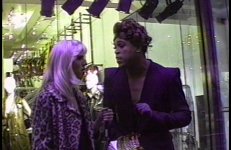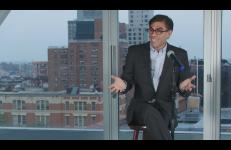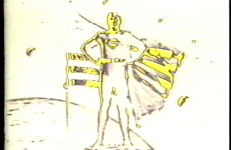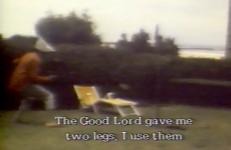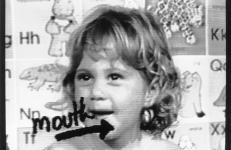Through dancing, The Motherfucker's Birthday shows the evil of the dictator and the horror people endure under powerful political leaders. The film presents dancing, a universal and uniquely human activity often representing joy, with eerie footage of Saddam and his sons’ torture tools while they dance. Bush also dances with a smirk across the screen while announcing a war that would destabilize a whole region.
Politics
In October 1969, the Videofreex visited the home of wealthy political and social activist, Lucy Montgomery, as she was hosting the Black Panther Party of Chicago during one of their most fraught times – the period just after Chairman Bobby Seale was wrongfully imprisoned for inciting riots at the Democratic National Convention a year earlier. This video documents an interview with the wife of Bobby Seale, Artie Seale. The video opens with a statement by Mrs.
A tribute to movement in resistance. Part of shamanic materialism.
Made in Germany, October 14th, 2004
While the Iraq war continues, a day's sightseeing and the features of a German hotel provoke a stream of thoughts about events large and small.
Museum Piece is the second episode in the Hotel Diaries series, a collection of video recordings made in the world's hotel rooms, which relate personal experiences and reflections to contemporary conflicts in the Middle East.
In this interview, American writer, artist, performer Eileen Myles (b.1949) discusses the various philosophies that motivate her work, including the language of film, embodied performance, and the alienation evoked by bodily vulgarity. Myles links her wide range of artistic and literary practice with notions of abstraction, improvisation, and the mythology of gender, which she explores in relation to her own identity as a working, middle-class lesbian woman. She reflects on the significance of geographical locations, both New York City and San Diego, on her art, and shares how her past struggles with addiction have shaped her life and practice.
Commissioned by the Whitney Museum of American Art and The American Center in Paris as part of their international Trans Voices project, Nation flashes contradictory formulations of language, politics, and medicine across a sharp and close screen. Blurring geography with the body's landscape, Nation reminds us that our bodies, like land, have been shaped by history into zones to be charted, conquered, divided, or made whole. "Think globally act locally," in one dense minute.
Natural Life is a feature-length experimental documentary challenging inequities in the U.S. juvenile justice system by depicting, through documentation and reenactment, the stories of five individuals who were sentenced to Life Without Parole (Natural Life) for crimes they committed as youth.
The youthful status and/or lesser culpability of these youths, their backgrounds, and their potential for rehabilitation were not taken into account at any point in the charging and sentencing process. The five will never be evaluated for change, difference or growth. They will remain in prison till they die.
In 1973 Joan Nestle co-founded the Lesbian Herstory Archives, an essential collection of documents, writings, and artifacts of lesbian cultural history. In 1979 she began writing erotic stories and has published two collections of writings: A Restricted Country (1987) and A Fragile Union (1998). She took a controversial stance in opposition to the 1980s feminist anti-pornography movement, thus becoming a fervent pro-sex activist in the “Sex Wars.” Interview by Nina Levitt.
Never Rest/Unrest is a hand-held short film about the relentless political actions in Hong Kong, spanning early summer to late 2019. The experimental short is an adaptation of the artist's practice of scaling oral history, utilizing the vertical 16:9 aspect ratio as a vernacular form. Never Rest/Unrest takes up the provocation of Julio Garcia Espinosa's "Imperfect Cinema" on the potential for filmmaking that aims towards an urgent, process-driven cinema. Dominant narratives of crisis pushed by news journalism are resisted.
Footage of a May 1970 rally featuring political speakers, including members of the Black Panther Party. Abbie Hoffman talks about fighting imperialism at home, and the Chicago 7 Conspiracy Trial. As the crowd chants “Free Bobby Seale,” the Videofreex attempt to interview several National Guardsmen. We see young black men talking to the troops, with one man telling a Guardsman, “I’ve got nothing... I went to Vietnam for you."
In this episode of Glennda and Friends, Glennda Orgasm and Mark Allen drink at Marie's Crisis Café, a piano bar in Manhattan. They interview other bar patrons and discuss topics including politics, Judy Garland, and the idea of mid-life crisis.
An episode of Glennda and Friends, hosted by Glennda Orgasm and Mark Allen.
From the performance by the same name, by Suzanne Lacy, Stan Hebert, Councilwoman Sheila Jordan, Frank Williams, Officer Terrance West, Mike Shaw, and Annice Jacoby, Oakland, 1995-6. Suzanne Lacy worked alongside youth activists, city council members and the mayor’s office to draft a Youth Policy Initiative that would create a dedicated stream of funding to serve youth needs. In the spring of that year, No Blood/No Foul was a performance on the eve of the Policy’s vote by the Oakland City Council, with Mayor, Council members and a large audience in attendance.
Notes for a DejaVu is a paramnesic experience of the images where Jonas Mekas still lives and we can hear him comment on the memory of an imaginary trip to Mexico. This film is shot with an expired 16mm celluloid during a popular protest. This is a movie that remembers. This is a political movie.
Notes from the Underground is a fragmented music video made from the 151 eye blinks George Bush made during his televised speech declaring war with Iraq. Bush’s eye blinks have been encoded into Morse Code to spell out a statement from 1969 by The Weather Underground.
Inspired by a riff on a popular joke “Everybody wanna be a black woman but nobody wanna be a black woman,” Notes On Gesture is a video comparing authentic and dramatic gestures. The piece uses the 17th Century text Chirologia: Or the Natural Language of the Hand as a guide to create an inventory of gestures for performance. The piece alternates between title cards proposing hypothetical situations and short, looping clips that respond. The actor uses her body to quote famous, infamous, and unknown women.
Now Let Us Praise American Leftists is an experimental video animation that seeks to eulogize and ridicule the American leftist movement of the past century. Foregrounding the exclusionary nature of American leftist politics, and its persistent refusal to allow more diversity in terms of race, ethnicity, and sexual orientation to enter into the larger political daialogue, the video presents representations of American leftists as they are: men with mustaches.
“Now too late, he understood her. The heart that pumped out love, the mouth that spoke the Word, didn’t count.”
--Toni Morrison, “Beloved”
A voice for which an event impossible to internalize remains distant. An event that in its distance does not cease to make the narration of something that should not take place anywhere foreign. The military massacre against unarmed students in 1968.
1968 was the opening of the Summer Olympics in Mexico City, ten days after the massacre of students and civilians by military and police on October 2 in the "Plaza de las Tres Culturas, Tlatelolco."
In this episode of The Brenda and Glennda Show, Glennda meets up with guest co-host Joan Jett Blakk to discuss Blakk’s 1992 presidential run. The pair interview people on the street outside of the 1992 Democratic Convention. They discuss topics including the police state, weaknesses of the two-party political system, feminism, and political elitism.
In One Man Ladies, Glennda Orgasm is joined by Vaginal Davis as they meet women on the streets of New York City to discuss Laura Schlessinger's book Ten Stupid Things Women Do to Mess Up Their Lives. The pair humorously explore the best ways modern women can find and secure a husband.
An episode of Glennda and Friends, hosted by Glennda Orgasm and Vaginal Davis.
"Gregg Bordowitz’s 2017 performance lecture Only Idiots Smile features the artist on a stool in the New Museum’s top-floor sky room, riffing on the formation of his identity. At one point, he explains his 'Jewish identity is the template thru which I understand all my other identities… how to appear to others, how we’d like to seem to others,' how others might frame themselves to be seen by us.
In Ontogenesis, Tanaka interweaves electronically altered images of American patriotism–the Statue of Liberty, Uncle Sam, waving flags–with footage of the Vietnam war, bombs dropping, and 1960s political figures (L.B.J. and J.F.K.) to chronicle the progress of American nationalism in the space/nuclear age.
Oued Nefifik: A Foreign Movie is an experimental narrative that incorporates an actual political situation. The film was shot in the immediate aftermath of violent repression following food riots in Casablanca, June 1981. It characterizes the experience of a political event for people outside of it. The point of view is that of an absurd and sympathetic character based on Jacques Tati’s Mr Hulot, who is distanced from the post-colonial milieu in which he finds himself.
This video proposes an ironic metaphor to grasp the follies of U.S. government action and inaction in Central America. The process of learning U.S. policy is similar to the process of a young child acquiring the principles of language. These dual senses of literacy operate on several levels, situating a child’s consciousness within the contradictions of history comments on the illusory innocence of childhood, and the unexamined, but real, guilt of the U.S. government, its supporters and clients.




